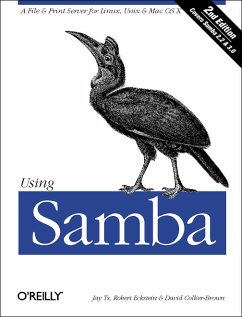This book, which has been officially adopted by the Samba Team and is under the GNU Free Documentation License (FDL), is a comprehensive guide to Samba administration. The current edition focuses on Samba 2.2 and covers the most important features of 3.0, which was under development as this book went to print.
Samba is a cross-platform triumph: it turns a Unix or Linux system into a file and print server for Microsoft Windows network clients. Samba is so robust, flexible, fast, and secure that many people are choosing it over Windows NT/2000/XP for their file and print services. Samba is also free software, licensed under the GNU General Public License.
This book will help you make file and print sharing as robust, powerful, and efficient as possible. The authors delve into the internals of the Windows activities and protocols to an unprecedented degree, explaining the strengths and weaknesses of each feature in Windows domains and in Samba itself.
Using Samba takes you from basic installation and configuration--on both the client and server side, for a wide range of systems--to subtle details of security, cross-platform compatibility, and resource discovery that make the difference between whether a user sees the folder they expect or a cryptic error message.
The range of this book knows few bounds. Wondering how to integrate Samba's authentication with that of a Windows PDC? How to get Samba to serve Microsoft Dfs shares? How to share files on Mac OS X? These and a dozen other issues of interest to system administrators are covered. A whole chapter is dedicated to troubleshooting.
Whether you're playing on one note or a full three-octave range, on your personal computer or an enterprise network, Using Samba will give you an efficient and secure server.
Samba is a cross-platform triumph: it turns a Unix or Linux system into a file and print server for Microsoft Windows network clients. Samba is so robust, flexible, fast, and secure that many people are choosing it over Windows NT/2000/XP for their file and print services. Samba is also free software, licensed under the GNU General Public License.
This book will help you make file and print sharing as robust, powerful, and efficient as possible. The authors delve into the internals of the Windows activities and protocols to an unprecedented degree, explaining the strengths and weaknesses of each feature in Windows domains and in Samba itself.
Using Samba takes you from basic installation and configuration--on both the client and server side, for a wide range of systems--to subtle details of security, cross-platform compatibility, and resource discovery that make the difference between whether a user sees the folder they expect or a cryptic error message.
The range of this book knows few bounds. Wondering how to integrate Samba's authentication with that of a Windows PDC? How to get Samba to serve Microsoft Dfs shares? How to share files on Mac OS X? These and a dozen other issues of interest to system administrators are covered. A whole chapter is dedicated to troubleshooting.
Whether you're playing on one note or a full three-octave range, on your personal computer or an enterprise network, Using Samba will give you an efficient and secure server.

